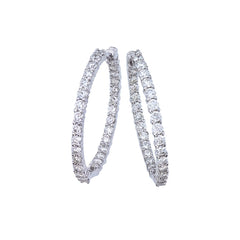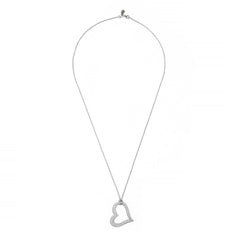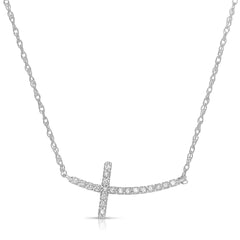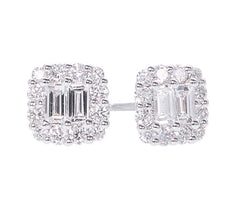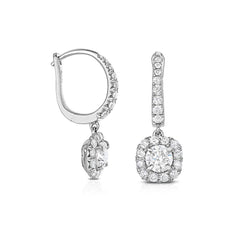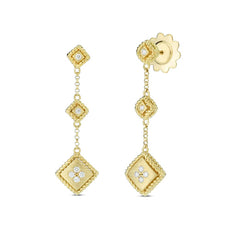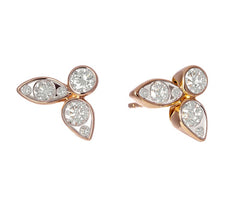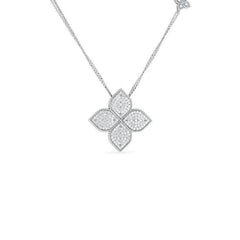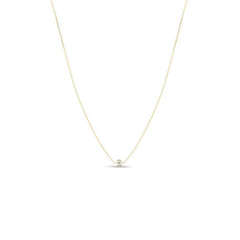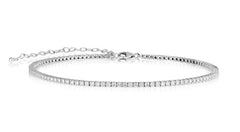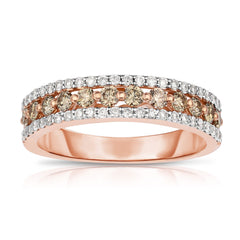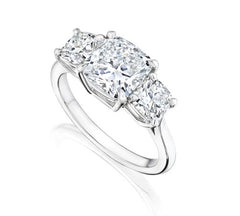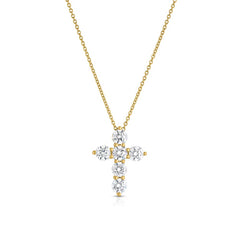Shopping for diamond jewelry is an exciting adventure. Whether you’re getting engaged, purchasing diamond earrings for your anniversary, or searching for a diamond necklace for her birthday, it can be a bit overwhelming. If you’re in tune with her style or have already been given a wish list, you’re off to a fantastic start. If you’re a little lost on where to begin, our team of experts has compiled the ultimate guide to diamond jewelry shopping so you can enjoy the experience. We’ll walk you through the essentials of selecting a high-quality diamond, along with additional features to look for and consider.
Choosing a Jeweler

When you select a diamond from a reputable jeweler, you can purchase your special piece with confidence. You’ll know you’re choosing from high-quality stones surrounded by knowledgeable staff who will support you through the process. A trusted jeweler will provide you with the patience, guidance, and education to ensure you are happy with your investment.
Selecting a Diamond
From diamond earrings to engagement rings and diamond necklaces, you’ll want to invest in the best quality diamond. Knowing how to select a diamond requires a bit of background on what criteria stones are graded on and how to select the one that is right for you. Let’s take a look at the GIA’s 4Cs of Diamonds, used as the strict worldwide grading standard set in place to ensure clients know exactly what they are purchasing.
The 4Cs of Diamonds
The 4Cs offer a reliable way to evaluate and grade diamond quality by rigorous evaluations across the industry. The 4Cs of a Diamond include:
- Cut
- Color
- Carat
- Clarity
Understanding Diamond Cut
Many factors go into evaluating and grading the cut of a diamond, including symmetry, dimensions, and light reflection. Ideal proportions were developed as specific industry standards for evaluating a diamond's cut. These proportions were set to help classify diamonds into five categories. As technology advanced, state-of-the-art techniques, including computer modeling and observation, allowed necessary revisions to the diamond grading systems to ensure optimal evaluations. The diamond cut grading system includes five grades
- Excellent
- Very good
- Good
- Fair
- Poor
The diamond cut determines each stone’s performance and is influenced by three factors: fire, brightness, and scintillation.
- Fire refers to the scattering formation of light or the colorful flash produced.
- Brightness is determined by the reflection of white light, both internally and externally.
- Scintillation refers to the pattern produced by the stone’s sparkle and is made by the diamond’s internal reflections.
To evaluate whether a diamond performs well, three additional factors must be evaluated:
- Proportions are specific measurements within a diamond and will include each facet length and angle.
- A Stone’s symmetry determines how well each facet is aligned. Symmetry is vital in determining the stone’s interaction with light.
- Polish refers to the finished look of the stone after it has been cut and the quality of its smooth, glassy finish.
Mastering the cut of a stone requires years of experience and skill and ensures each diamond can provide optimal performance. As you browse through diamonds, notice how the stones play with the light and determine which diamonds perform the best. Your diamond should brilliantly capture and reflect light. If you notice a dull, lifeless look, this indicates a poorly cut stone.
Understanding Diamond Color
The color of a diamond actually refers to its lack of color. The GIA’s D-to-Z Color Scale grading system was developed to provide an objective way to rate the stones consistently. At Fink’s Jewelers, we pride ourselves on our colorless selection of diamonds, offering only those stones worthy of our Superior Quality® color range, D-to-K. The slightest variations in color between two diamonds can impact its quality and price. It’s advised you view the stones in more depth, as slight color variations generally go unnoticed to the naked eye. If you’re purchasing an engagement ring, loose stones are ideal for examining so that the settings or placement of the diamond cannot affect reflections.
While viewing stones, keep these helpful tips in mind:
- Use the same background to assess all stones so it does not skew the diamonds' colors.
- Examine each diamond under the same lighting to give you the most accurate comparison.
- If viewing with the naked eye, be aware the clarity and cut of the stone may also play a factor in its color.
Understanding Carat Weight
A common misconception is a diamond’s carat weight refers to its size. Understanding the difference will help you differentiate between two stones that hold the same carat weight on their grading reports yet do not look physically similar in size.
Diamond size appearance has more to do with its cut than carat weight. Its weight refers to how much the stone weighs in milligrams. One metric carat is defined as 200 milligrams. Each carat is then subdivided into 100 points, allowing precise measurements down to the hundredth decimal. Typically, as the carat size increases, so does its price due to large stones' rarity. However, all 4Cs in combination determine the stone’s overall value.
Understanding Diamond Clarity
The GIA Clarity Scale was designed to grade and categorize stones according to their inclusions or tiny imperfections. Grading a diamond’s clarity includes factoring in the location, size, and number of imperfections observed when examined under 10x magnification. The Clarity Scale provides the industry with a precise method for assigning a diamond to one of six clarity categories:
- Flawless
- Internally flawless
- Very very slightly included
- Very slightly included
- Slightly included
- Included
Identifying Imperfections
Specific identifying marks determine a diamond's clarity. These marks may include:
- Large feathers: cracks or breaks in the stone
- Dark inclusions: tiny, black specks in the stone
- Knots: crystal inclusions found on the surface of the stone
- Reflectors: mirrored images of inclusions created during the polishing process
Understanding Diamond Cut vs. Diamond Shape
The shape and cut of a diamond are often used interchangeably. It’s a common misconception the two are the same. You may have heard your significant other mention princess cut or pear-shaped diamond earrings. The shape of a diamond refers to the outline of the stone. While not part of the 4Cs, the shape is a significant piece of selecting the perfect engagement ring or diamond necklace.
Diamond Shape Options
If you aren’t familiar with their preferred stone shape as you venture out to find your gift, here’s a helpful breakdown of the most sought-after diamond shapes:
Round Brilliant Diamond
This shape is the most purchased of all diamond shapes, from rings to diamond studs. The brilliant round diamond is a classic, making up over two-thirds of diamond ring center stones purchased. A round shape stone provides stunning sparkle, as with our White Gold Solitaire Diamond Necklace.
Princess Cut Diamond
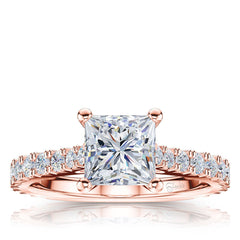
The princess is a modern square-shaped diamond. The appearance of the princess stone’s size can be enhanced by the cut of its table or surface. Princess-shaped diamonds are gorgeous as a center for any engagement ring or diamond stud earring.
Oval Diamond
The lack of pointed edges on the oval-shaped diamond makes them a more durable choice, particularly for engagement rings. The oval-shape performs remarkably in light.
Selecting the Perfect Diamond Earrings
When choosing the perfect diamond studs for yourself or a special occasion, there are a few helpful factors to keep in mind. We understand how tempting it is to fall in love with the first pair of diamond studs that dazzle in the display. Keep in mind, your new diamond earrings are an investment, and you’ll want to make the right decision.
Occasions for Diamond Earrings
Diamond earrings are an ideal addition to every jewelry collection. If you're unsure of the style you’re looking for in your new diamond earring purchase, considering the occasions they will be worn is helpful. Perhaps you’re shopping for diamond earrings for an upcoming event or gifting a beautiful pair of diamond studs for a special celebration. If you’re searching for options that can easily be worn daily, Bezel Set Diamond Studs pair perfectly with casual and dress attire. If you’re planning to gift a more extravagant look for black tie events and special nights out, you may want to lean towards the exquisite Roberto Coin Hoop Diamond Earrings.
Applying the 4Cs to Selecting Diamond Stud Earrings
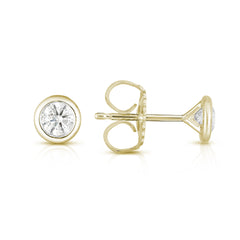
The color, cut, clarity, and carat weight will apply to your diamond studs as well. However, selecting stones for your diamond studs can be a slightly different process than selecting a solitaire for an engagement ring. We’ve put together our best recommendations for selecting high-quality diamond earrings that meet your needs. Let’s examine how each of the 4Cs may affect your diamond stud options and where you may find wiggle room to adjust your top priorities:
Diamond Stud Cut
We all want to show off diamond stud earrings that sparkle for attention. If this is a priority near the top of your wish list, the cut of your diamond earrings may be where you’ll focus most of your attention. Selecting diamonds with a brilliant cut and excellent facet arrangement will provide your lobes with that sparkle you crave. For optimal appeal, consider diamond earrings with stones rated Excellent or Very Good. These two cut grades provide diamond stud earrings with ideal proportions, symmetry, and high-quality craftsmanship.
Diamond Stud Color
The facets on a diamond act as tiny mirrors, reflecting the objects closest to them. This is beneficial when purchasing diamond studs since the stones can reflect the color of the metal setting you select. This enhances the overall perception of the diamond stud earring’s color. If you are shopping on a budget, you may be thrilled to know this allows you to select a pair of diamond earrings slightly lower on the color scale to save money without sacrificing the appearance of color.
Diamond Stud Clarity
If you’re searching for diamond earrings, you have some room for forgiveness with the imperfections of your diamond earring stones. As you compare diamond studs, you’ll begin to see that inclusions and blemishes are less noticeable when dangling from the earlobes. Your diamond stud earrings are less likely to highlight imperfections, allowing you to be less particular when evaluating where the stones fall on the clarity grading scale.
Diamond Stud Carat Weight
The carat weight of the diamond stud earrings you choose may tend to be the C that catches most eyes. While carat weight tends to pull focus and captivate most shoppers, don’t forget to consider all 4Cs before falling in love with the 2cttw diamond studs.
Selecting the Shape of Your Diamond Earrings
As with all diamond jewelry, diamond stud earrings come in a variety of shapes. While it all comes down to preference, you may not be aware of their ideal diamond shapes. Let’s examine the two most popular solitaire diamond stud shapes offered.
Round Brilliant Stone
The round brilliant diamond has always been the number one choice for diamond stud earrings. The round cut of the diamond magnifies brightness, scintillation, and fire. If the person you’re gifting has other diamond pieces in their collection, take a peek at the shape of the stones in their bracelets or diamond necklace. It’s a great way to help complete a set.
Princess Cut Stone
Diamond stud earrings have always been a top seller, as they can boast the appearance of a larger carat weight. Its ability to create incredible sparkle is partly due to the facet arrangement this shape allows.
Selecting the Precious Metal for Your Diamond Earrings
Selecting the setting for your diamond studs may include a bit more than just preference. If this is your first pair of diamond earrings or you are surprising a loved one as a gift, there are three factors to consider. When choosing your diamond studs, evaluate:
- color
- weight
- possible metal allergies
Precious Metal Color for Your Diamond Earring Setting
We’ve shared that diamonds, particularly in diamond earrings, are highly reflective of their immediate surroundings. This makes the choice of metal color an important consideration. Weigh your options wisely and think about skin tone, preference, and the metal of jewelry pieces already in their collection.
Weight of Your Diamond Earring Setting
While it’s not at the top of anyone’s list, the weight of diamond earring settings should be considered. Platinum enhances the brilliance of a stone yet is denser than gold. This will provide a heavier feel which could cause some discomfort to sensitive lobes. While this weight difference is slight, it becomes noticeable after extended periods of wear.
Metal Allergies
Unfortunately, metal allergies and sensitivities affect more people than you may realize. This may be due to metals used in gold alloys, such as copper and nickel. If you are aware of metal allergies or sensitivities, we suggest avoiding yellow, white, and rose gold settings. Platinum is ideal for sensitive lobes, as it is hypoallergenic and helps reduce reactions and irritation.
Selecting Diamond Earrings with a Secure Setting
Settings play a vital role in the security of your diamond earrings. Securing your stones will help protect you from loss and add peace of mind to your investment.
Security in Your Setting Selection
The security of your diamond earring stones relies on the protection your setting provides. While a minimal coverage setting may boost the appearance of your diamond’s size, it provides them with the least amount of protection, especially with larger carat weight stones. A bezel setting offers your diamond studs the most protection but tends to cover more surface areas. If you opt for this setting style, we recommend considering platinum or white gold to enhance your diamond's size.
Security in Your Diamond Earring Backings
Before purchasing your diamond earrings, examine the security of their backings. This quick step can help protect your precious stones. A high-quality diamond earring backing will consist of locking backs or screw-on backs for added protection. You may also find friction backings that offer your diamond earrings extra security.
Selecting the Perfect Diamond Necklace
A diamond necklace is one of the most noticed and versatile jewelry accessories. Pairing a diamond necklace with pieces from her collection makes a wonderful gift for that special someone in your life.
Budgeting for Your Diamond Necklace
Several determining factors go into the pricing of diamond necklaces that you may not have to consider in other fine jewelry pieces. While the number of diamonds your necklace features is certainly a heavily weighted factor, you must also consider the chain that will grace her neck. The quality, length, and precious metal which make up the chain will help determine the final price of the diamond necklace you select.
Diamond Necklace Styles
Selecting a diamond necklace may be a bit more complicated than choosing a beautiful pair of diamond earrings. A diamond necklace tends to be out on full display, while earrings may be hidden with locks of hair or sit daintily in the lobes as delicate accents. Shopping for the ideal diamond necklace may require a bit more insight into her preferences. You’ll want to take note of a few helpful signs to guide you in the right direction, including:
- metal preference
- length of chains in her collection
- jewelry style
- clothing style
- special consideration for durability
If you’re unable to gather a few hints or enlist the help of a friend, you may find inspiration from some of the best-selling diamond necklace styles we offer:
Diamond Solitaire Necklace
A solitaire diamond necklace is always a best seller! It’s a classic style that pairs well with any attire for any occasion. The solitaire diamond necklace style displays a single gorgeous stone. You will typically find it set in a four-prong setting or a beautiful bezel setting. This open-style setting allows light to flood the diamond, resulting in brilliance.
Heart Pendant Necklace
The heart-shaped diamond necklace is always a popular symbol of love. Like our 18k White Gold Open Heart Pendant, a heart diamond necklace is a timeless expression of affection she will love wearing around her neck. With an impressive 2.19 cttw of diamonds, this twenty-four-inch necklace will make the perfect gift for any occasion.
Cross Necklace
We offer an extensive collection of cross diamond necklaces. From subtle diamond accents to crosses encrusted with diamonds, we have a design for every preference. If you’re searching for a unique diamond necklace, we recommend our Sabel Collection Sideways Cross with Diamonds. She’s sure to love the contoured cross that brings a special look to the traditional cross style.
3-Stone Necklace
The three-stone diamond necklace style holds symbolic meaning for many. As with a three-stone engagement ring, it symbolizes the past, present, and future. You will typically find this diamond necklace design with its three diamonds suspended from the chain alongside each other or vertically in a drop-down style.
Tennis Necklace
If you’re celebrating a grand anniversary or looking for a gorgeous piece for your next big event, the tennis diamond necklace is the way to go. The tennis necklace features all diamonds encrusted around the chain for maximum exposure. A tennis diamond necklace is the ultimate luxury jewelry item.
Diamond Choker Necklace
Some women prefer a more modern twist on the tennis diamond necklace design. A choker style is designed to be worn with a tighter fit around the neck than the tennis necklace. Our Sabel Collection Round Diamond Choker is irresistible and offers a setting that gives the appearance of princess cut stones for its 2.55cttw round diamonds. It’s a must-see diamond necklace if you’re shopping for a modern lady.
Dancing Diamond Necklace
The dancing diamond necklace style maximizes a stone’s brilliance. The positioning of the diamonds is set to allow maximum exposure and capturing of the light from all angles. This creates a dazzling display, as the diamonds appear to dance in the light.
Selecting Length and Metal for a Diamond Necklace
Diamond necklaces are gorgeous in any precious metal setting, so knowing her style is helpful. As with diamond earrings, you’ll find options in yellow, white, and rose gold, along with platinum. Platinum offers the most durability and may be ideal if you’re gifting an active woman or new mom who may have years of tiny grasping hands ahead of her to consider. Remember to take into consideration the precious metals she currently has in her collection for easier pairing.
You will also find several options in the chain length. The most common lengths for diamond necklaces are 16 and 18 inches. However, certain styles are designed for longer lengths, so you may find options up to 30 inches and beyond. Envision where you would like to see the diamond fall to help you narrow down the length of the chain for a helpful guide.
Selecting the Perfect Ring Style
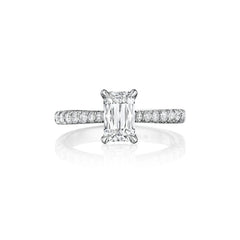 If you’re preparing to propose, selecting the ideal ring could include many factors. While your new knowledge on the 4Cs of Diamonds will serve you well during your center stone selection, the overall style of your ring will bring you much to ponder. From the precious metal to the style of the setting, the engagement ring you choose will be perched upon her finger forever. If your significant other has not yet begun dropping little hints, we’re here to help. We’ve compiled some helpful tips for selecting the right diamond ring metal and setting.
If you’re preparing to propose, selecting the ideal ring could include many factors. While your new knowledge on the 4Cs of Diamonds will serve you well during your center stone selection, the overall style of your ring will bring you much to ponder. From the precious metal to the style of the setting, the engagement ring you choose will be perched upon her finger forever. If your significant other has not yet begun dropping little hints, we’re here to help. We’ve compiled some helpful tips for selecting the right diamond ring metal and setting.Determining the Engagement Ring Metal
While selecting the precious metal for an engagement ring is usually a matter of preference, think about which precious metal she wears most. Have you seen her admiring rings online or in magazines? Have they followed a particular precious metal pattern?
If you’re searching for the perfect look for your own finger, what do you envision when you see the stunning ring on your finger? Do you feel your skin tone looks best against certain metals? Will coordinating your current jewelry collection be a determining factor?
Determining the Engagement Ring Setting
There are numerous engagement ring styles, and many will catch your eye that you may not have considered yet. Don’t let this be overwhelming. Instead, embrace it and enjoy the experience. Whether you’ve had your heart set on a ring style for years or you’re surprising her with little to go on, the moment you begin your search, everything will catch your eye! We suggest starting with some of our favorite engagement ring styles to give inspiration during your search:
Solitaire Engagement Ring Style
Solitaire diamond rings are a timeless style and magnificent in any precious metal setting. The solitaire setting was designed to highlight a single center stone for maximum brilliance and exposure. It’s a classic choice while leaving plenty of room for wedding band pairing possibilities.
Infinity Engagement Ring Style
The Infinity setting offers a romantic and symbolic gesture set in a contemporary style. This engagement ring setting intertwines the metal, symbolizing the joining of your lives into one. The Infinity design also represents strength and commitment and looks beautiful with multiple precious metals in one.
3-Stone Engagement Ring Style
This symbolic style represents your past, present, and future together. A meaningful engagement ring setting, this three-stone ring style is also referred to as the trinity ring. Traditionally, the center stone is placed slightly higher than the side stones for enhanced exposure.
Halo Engagement Ring Style
The halo ring style is well known for its dazzling accent diamonds that surround the center stone. This design creates a glorious halo effect and can portray a larger center stone with unmatched performance.
The Difference in Fink’s Jewelry
We pride ourselves on many characteristics that set us apart from other jewelry stores. Beyond our extensive collection and unique fine jewelry offerings, you’ll find we offer so much more. From customer service with heart to the customer guarantees that will keep you a forever Fink’s family member, you’ll find everything you need and more.
The Fifth C of Fink’s Diamonds
At Fink’s Jewelers, we go above and beyond in everything we do. This includes the 4Cs of a Diamond. We rely on our 5th C for every diamond we offer. For over two decades, our family-owned stores have relied on the expertise of this treasured fifth C, Clif. Clif expertly hand-selects every Fink's diamond you will see in our stores and on our website.
Clif individually inspects each stone that arrives in our stores in its entirety. Clif ensures each diamond undergoes a rigorous inspection and meets his high standards. Clif expects a Fink’s-quality stone to offer optimal cut, light performance, brilliance, and durability. Using his meticulous methods, he’s known to reject roughly 99% of the diamonds he inspects every year, regardless of its excellent grading report. That’s a sign of quality you can trust in a jeweler. In fact, we love sharing Clif’s motto with our clients – if I wouldn’t place it on my wife’s finger, it’s not good enough to be a Fink’s diamond.
Custom Design Options
If you don’t find exactly what your heart desires, or you have a special design in mind, our custom options are meant for you. From engagement rings and diamond earrings to the diamond necklace you wish to modify, we are here for you. This custom option offers you the freedom to create unique, sentimental jewelry for your special someone. Our skilled jewelers and design team will help walk you through the process and bring your vision to life. Whether this is a surprise or you’re working together, we can turn your jewelry ideas into a reality.
Find the high-quality fine jewelry selection for your special event or occasion from jewelers you can believe in.



